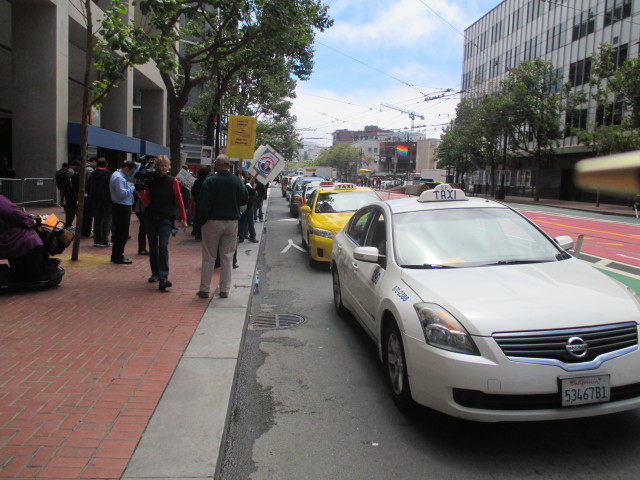Fake cab outfit could lose its license, pay $7.5 million fine; ruling could have a broader impact on the sharing economy

By Tim Redmond
JULY 16, 2015 – In a scathing decision that cuts to the heart of the problems with so-called ride-sharing, an administrative law judge yesterday ruled that Uber should be suspended from operating in California and be fined $7.5 million.
The 92-page ruling by the California Public Utilities Commission’s chief judge, Karen V. Clopton, notes that Uber has failed to demonstrate its compliance with the sorts of laws that apply to all other cab companies, including offering rides to people with disabilities and picking up passengers with no regard to what part of a city they live in.
The judge ruled that Uber, operating as Rasier-CA (a fully-owned subsidy of the corporation), never provided mandated reporting on, for example,
efforts to date for accommodating visually impaired, persons with service animals, and persons requiring a wheelchair accessible vehicle.
Normal licensed cab companies are required by law to comply with the Americans with Disabilities Act, which means that their drivers pick up all passengers, including those who have special mobility or visual needs.
Uber hasn’t shown that it meets that standard. In fact, when the CPUC asked for information on how many rides were offered to people with disabilities, “no actual data was provided,” the ruling states.
Uber also failed to provide numbers by zip code of where drivers were picking up passengers. And it did not satisfy the judge that it was collecting and providing information on driver safety, including how many at-fault accidents its drivers were involved in.
Help us save local journalism!
Every tax-deductible donation helps us grow to cover the issues that mean the most to our community. Become a 48 Hills Hero and support the only daily progressive news source in the Bay Area.
Uber, through its subsidiary, said that it was too difficult to compile that information – a little odd for a tech company that has reams of data on every one of its drivers. In fact, the judge noted:
Rasier-CA’s assertion that the reporting requirements are unduly burdensome, cumulative, and overly broad is undermined by the fact that other regulated TNCs have complied with Reporting Requirements. Additionally, as we discuss, infra, Rasier-CA’s unduly burdensome, cumulative, and over broad objections are factually and legally unsupported.
This doesn’t mean Uber will be shutting down in California any time soon. The decision won’t take effect for 30 days, the company has a chance to appeal – and could resolve the matter by providing the necessary information.
But that information might be embarrassing – it might show, for example, that people in wheelchairs can’t rely on Uber, that people who live in low-income neighborhoods aren’t served by Uber, and that, unlike traditional regulated cab companies, Uber serves only a small slice of the public.
The company, and other similar “ride-sharing” operations, have refused to comply with San Francisco’s taxi laws. Instead, they’ve gone to the state PUC to get licensed.
But now even that agency is apparently concerned that Uber won’t cooperate with regulators. In fact, the vast majority of the $7.5 million fine is for contempt – that is, for refusing to provide information.
It’s part of the pattern of these companies, which have operated for years as if they were above the law.
Uber tried to argue that some of the information is a trade secret, but the judge shot that down quickly:
A trade secret claim cannot be used as a shield to deny access to the very regulatory agency that has ordered the information’s creation and compilation.
There’s a fascinating element to the decision that could impact other “sharing economy” companies like Airbnb. Uber has tried to argue from the start that it’s not a cab company; it’s just a platform that connects drivers with customers. Airbnb makes the same claim: It’s not a hotel company, it’s just an online platform that connects hosts with customers.
The judge didn’t buy it, at all:
Despite Uber’s attempt to distinguish itself from the transportation services by recasting itself as a technology company or a wireless service, the facts are unrefuted, and this Commission has found, that Uber is providing a transportation service as a facilitator.
The ruling makes an attempt to figure out how much money Uber is making, and it’s fascinating. The California subsidiary grossed $40 million, and estimates that Uber’s gross revenue is $3.6 billion, and its net share of that income would be $720 million.
Those figures are not publicly available, because Uber is still a private company.
So now Uber has a choice: Fight this ruling to the bitter end, and hope that the five members of the state PUC will be swayed by politics and lobbying and overturn the judge’s decision – or just pay the fine (modest given the company’s revenue), and start providing the information that the CPUC requested.
We will be watching.




